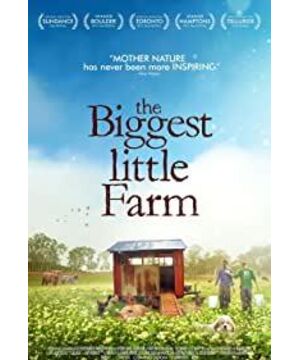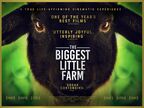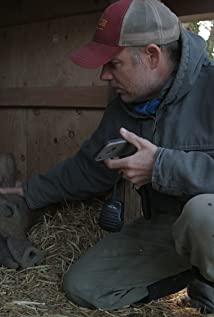There used to be a popular saying in the film and television circles: a screenwriter who does not want to be a director is not a good editor.
This kind of slurred sentence was originally to ridicule the particularity of the director's profession, that is, every type of work involved in film and television production, directors seem to know a little bit, so that they can be worthy of that identity.
But today, the documentary called " The Biggest Little Farm " (The Biggest Little Farm) recommended by Mr. DOCO to everyone is very likely to overturn this conclusion. Perhaps the above sentence will be changed to: I don’t want to. Being a farmer’s director is not a good husband.
I say this because John Chester , the producer of this documentary, was an Emmy-winning film and television director, but because he wanted to give his family and pet dogs a home close to nature. , And then took them to the countryside of California to open up wasteland and start a farm.
In the past ten years, he and his wife Molly not only successfully managed a farm covering an area of more than 200 acres, but also took a complete picture of the process of growing crops, raising animals, and engaging in organic agriculture. It was made into this documentary.
In other words, John Chester became a director by the way after he completely transformed the industry and became an authentic farmer.
And this ten-year work successfully won the second place in the audience's choice award in the documentary section of the Toronto International Film Festival last year . It was later shown in many regions in North America, and it earned a box office of 4.9 million U.S. dollars in one fell swoop!
It is estimated that many people would not have thought that the reason why the John Chesters family went to run the farm was that a dog they adopted barked too loudly and the landlord drove them out of the apartment.
But for John Chester, he did not want to abandon his pet dog because of this, and his wife Molly is also a woman who loves small animals and nature. Based on the common ambition, they decided to buy a farm. And developed a self-sufficient ecosystem there to protect their homeland.
However, things are difficult, when John Chester a beginning to the farm location Moorpark when (Moorpark), in fact, the local environment is not a picture of paradise, on the contrary, where the soil is dry but barren, animal Nearly extinct, several farmers have left because of poor management.
For this reason, John Chester cast a big net on the Internet, and finally found an experienced agriculturist Alan York (Alan York), who will act as a consultant with full authority to make a scientific and reasonable plan for the future of the farm. .
According to Alan York’s opinion, they first removed all the weeds on the farm, and then used large machinery for composting to increase the fertility of the soil, and then planted a variety of crops in different areas, including Peach trees, apricot trees, citrus trees, strawberries, etc.
At the same time, they bought cubs of various animals, including chickens, ducks, cattle, sheep, fish, etc., and even earthworms and breeding pigs that can loosen the soil were introduced.
Under the guidance of Alan York, they collected the feces of these animals into the compost, and then let the wriggling earthworms inject various microorganisms into it .
When the compost is fermented, the fertilizer will be added to the irrigation system every time it is watered, and then sprayed to the entire farm.
In addition, after the grass grows up on the farm and Vientiane is renewed, when facing the constant invasion of foreign creatures, they use snow owls to deal with gophers, ducks to deal with snails, and shepherds to deal with coyotes. The sense of balance and diversity of the farm ecosystem .
After several years of hard work, John Chester and Molly planted tens of thousands of fruit trees, nearly 200 kinds of crops, and raised more than 850 kinds of animals . The special business model of the farm also attracted more than 60 employees. join in. Whenever the farm harvests, the local farmers' market will show their produce.
It is worth mentioning that while other farms in this area lost soil due to rain and storms, the farm managed by John Chester was not lost due to scientific design and arrangement.
In fact, when John Chester started this farm, he didn't think about making this process into a documentary. Because he had no experience in farming at that time, and he didn't even know what the future of the farm would be like.
However, when he realized that "a large number of viewers might be interested in the animals on the farm", the old film talent decided to focus the camera on his farm. He said: "I spent 8 years thinking about how to tell this story and how to anthropomorphize animals without destroying this great biological experiment."
Years of shooting experience let him know how to mobilize his photography skills.
In this film, in order to take pictures of bees and snakes, he borrowed a thumb-sized Innovision macro lens , and in order to photograph snowy owls and other night predators, he also used an infrared camera , and all these efforts are trying to be comprehensive To restore the various biological conditions of the farm.
The documentary was shown at the Telluride Film Festival and the Toronto Film Festival. It received a good response, and it triggered bids from many film and television companies such as Disney, Sony Classics, National Geographic Channel, and Netflix. Its popularity in the North American market is evident.
Regarding the subject of this documentary, Chester’s statement is also very unique: “Most natural documentaries are based on fear. Humans are greedy. The victim is always the earth. The audience will only feel depressed and frustrated after watching. Desperate. But what I want to show is a healing experience. We can’t just watch the things we love die.”
Just like the picture presented in the film, Chester’s farm is like a garden of Eden with the fragrance of birds and flowers. Through people’s efforts, the soil has been improved and the earth has rejuvenated. Everyone can enjoy themselves in this homeland. Nature can be said to have reached a high degree of harmony.
And the most attractive part of this film is that it subtly shows the audience the giving and taking of nature. John Chester also conveys his dreams to everyone through images. This kind of positive value orientation is positive. It is the most lacking in documentaries at present.
Just like the lyrics of the ending song "sun, flood, or drought", "We are in a world bigger than we know, our abilities are greater than we can do, and fear is just another solution. We will also plant our own garden."
View more about The Biggest Little Farm reviews








